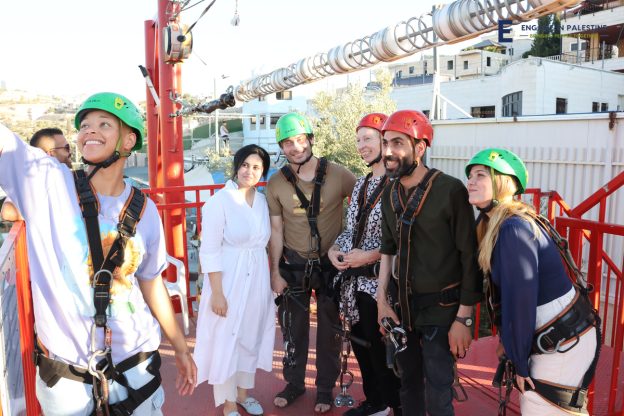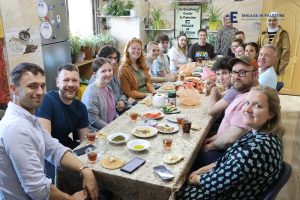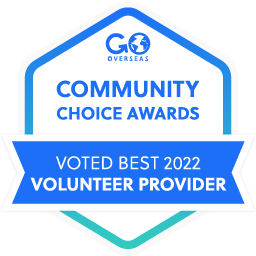Orientation Guide for Visitors to Palestine: Founded in June 2011 by dedicated Palestinian community servants, Engage in Palestine was established in order to create a bridge between Palestinian students and their peers abroad. Having since grown to become a pillar of the community, Engage in Palestine offers educational, cultural, social, and community services to a diverse group of international students, interns, and volunteers, as well as to its Palestinian students in Hebron; all geared to enrich the local society and student population of Hebron, West Bank.
Fully licensed as a cultural and educational center by the Palestinian Ministry of Education (which also supervises the center’s quality of education), we are fully equipped with computers, high-speed wireless internet, numerous classrooms, and a large kitchen to provide many learning and enrichment opportunities to this broad group of participants.
As part of our mission, we invite international volunteers of all ages—from gap year students to retirees—to join the center for our year-round programs, which can last anywhere from 1 week to 3 months. In over ten years, we have hosted more than 1500 participants, including students, graduates, professionals and retired people who come from a myriad of countries around the world including the USA, UK, Brazil, Mexico, Canada, Austria, Belgium, Bulgaria, Croatia, Republic of Cyprus, Czech Republic, Denmark, Estonia, Finland, France, Germany, Greece, Hungary, Ireland, Italy, Latvia, Lithuania, Luxembourg, Malta, Netherlands, Poland, Portugal, China, Malaysia, Ethiopia, Romania, Slovakia, Slovenia, Spain, Sweden, Australia and Japan.
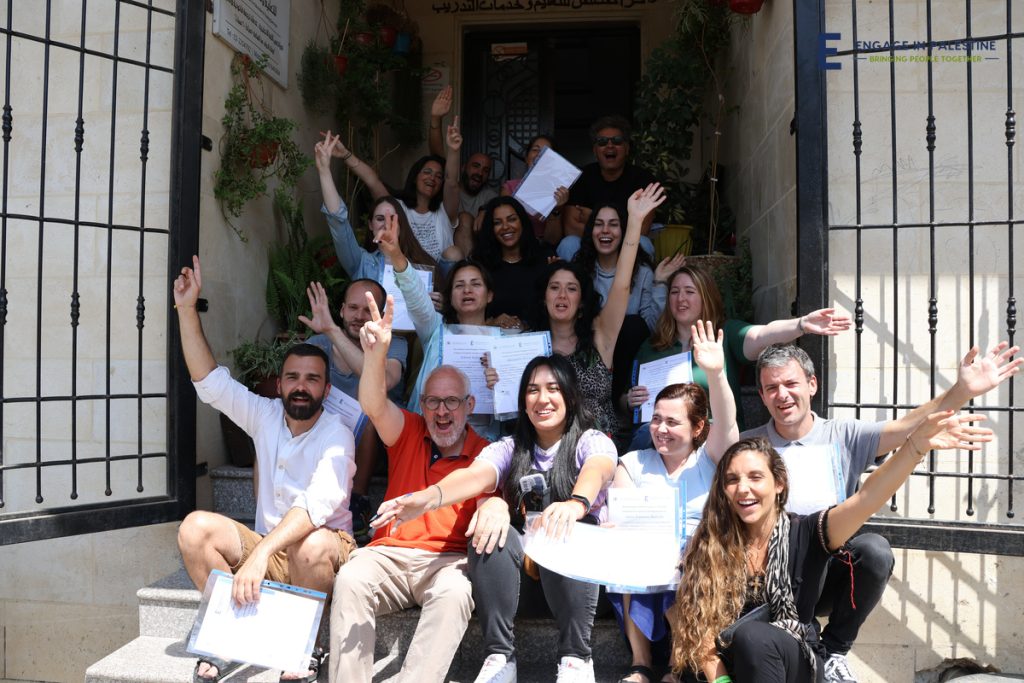
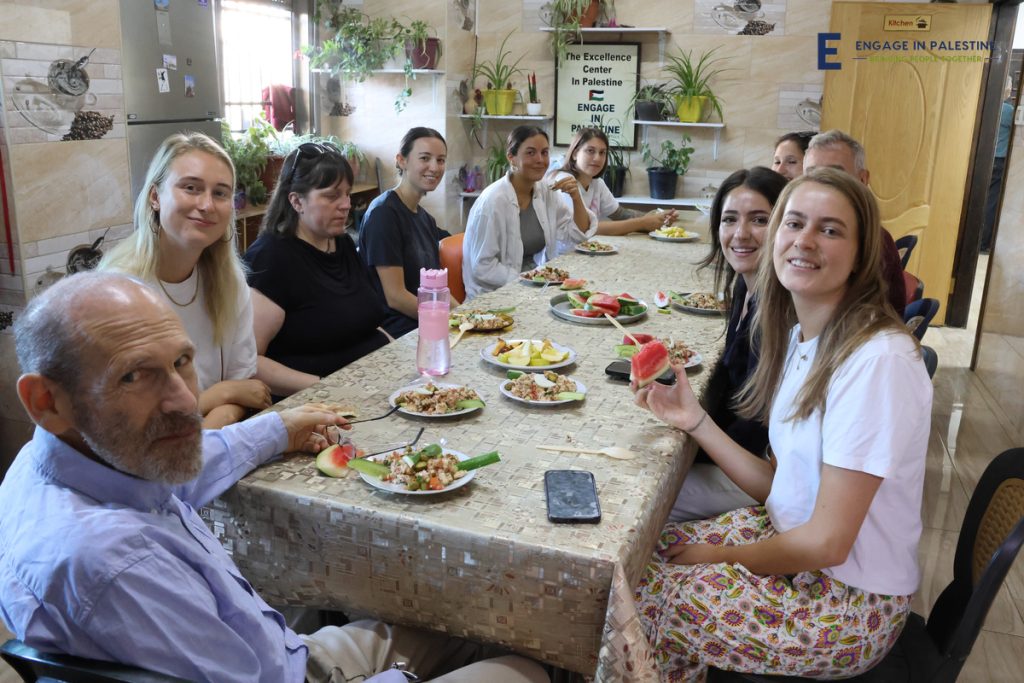
Located in the heart of Hebron, Palestine, under the supervision of the Palestinian Authority, the center is easy for international and Palestinian students alike to access. Its central location on Ein Sarah Street also connects it well to Hebron’s municipal and educational organizations and its numerous restaurants, supermarkets, banks, gyms, shops, NGOs, cafes, mosques, holy sites, and much more.
Table of Contents
Orientation Guide for Visitors to Palestine
Some Background on Hebron
Locally known as “Al Khalil,” Hebron is the largest city in the West Bank and is home to over 215,000 Palestinians. Located 30 kilometers (19 miles) south of Jerusalem and 22 km south of Bethlehem, Hebron is bursting with fascinating history, culture, and experiences, such as the Cave of the Patriarchs, which Jews, Christians, and Muslims recognize as the burial site of Abraham, Isaac, Jacob, Sarah, Rebecca, and Leah. This, therefore, makes Hebron one of the holiest cities for all three world religions. For that reason, it is particularly appealing for Israeli settlers – who have thus far occupied half of the city and have established a militarized settlement near the Cave.
With its long and fascinating history, Hebron is most associated with Abraham as archeological evidence reveals that it was a thriving city as early as the Bronze Age. Having also been ruled by the Byzantines, Muslim caliphates, and crusaders between 1000 and 1900, the Ayyubids, the Mamelukes, and the Ottomans all laid claim to Hebron. To this day, the Old City still maintains architecture dating back to these iconic periods.
However, the modern history of Hebron is just as sordid as its complicated past. Following the Ottoman Period, Hebron was controlled by a British Mandate from 1920 to 1948. It was then annexed in 1950 by neighboring Jordan, which held it until after the Six-Day War of 1967, which began the era of the Israeli Occupation. Later, following the 1995 Oslo Agreement, Hebron was then divided into two disparate sectors: H1, controlled by the Palestinian Authority, and H2, controlled by Israel. Today, around 120,000 Palestinians live in H1, while around 30,000 Palestinians and 700 Israeli settlers live in H2.
This division is a point of international controversy as it is heavily monitored by the Israeli Defense Force. Although the Israeli military controls H2, the Jewish settlement is widely considered to be illegal by the international community (although the Israeli government disputes this).
Hebron’s surrounding landscape is breathtaking as white limestone buildings tower majestically throughout the city and surrounding villages. Furthermore, Hebron is famous for its distinctive glass and ceramic manufacturing, limestone quarries, grape and fig farms, beautiful olive wood products, and thriving shoe industry. Indeed, international students and volunteers are highly encouraged to explore these facets of Palestinian culture, and we also offer frequent tours of these areas.
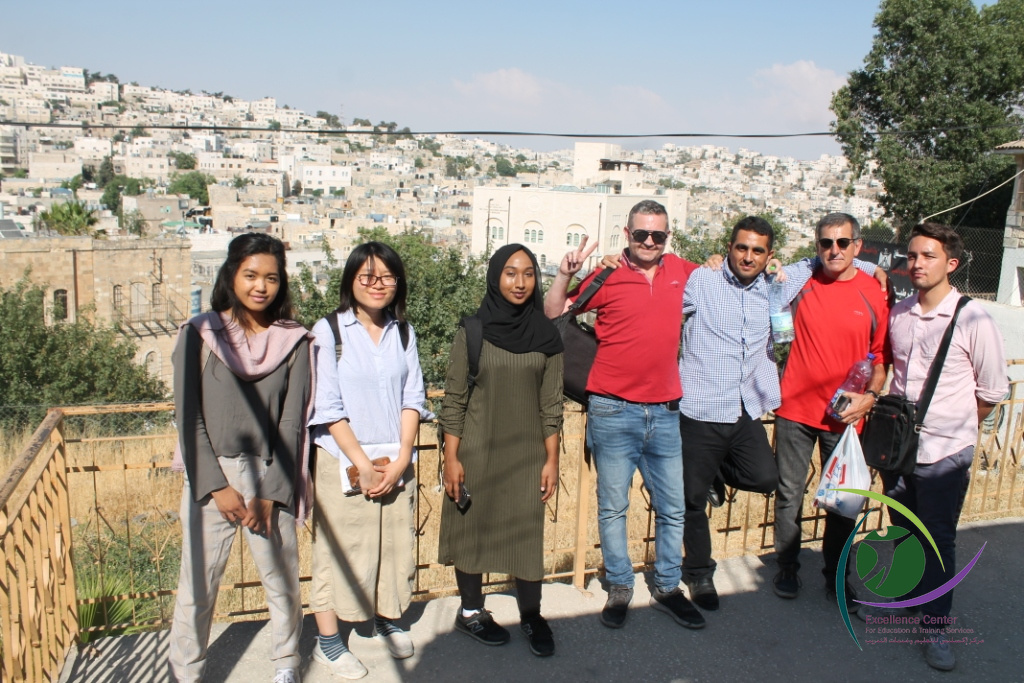
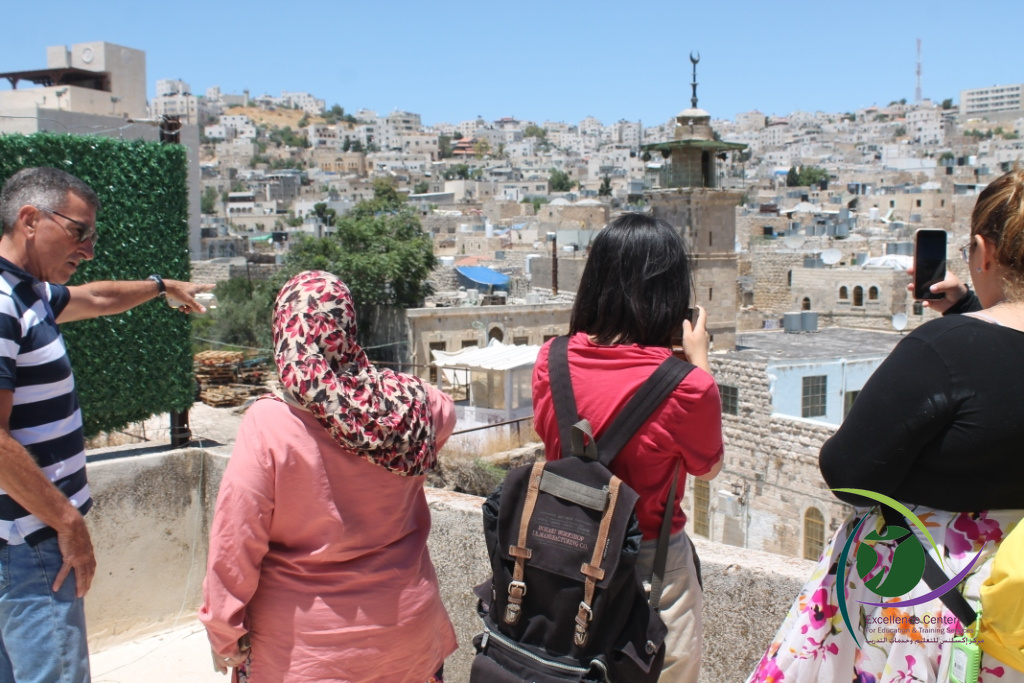
Additionally, Hebron is also home to several universities. Hebron University offers courses in religion, the arts, and sciences, and instruction is provided in both Arabic and English. The Palestine Polytechnic University, on the other hand, provides instruction in various fields, including engineering, business, and applied sciences.
Hebron’s rich cultural and historical heritage can be experienced within the ancient walls of the Old City. In fact, Hebron’s Old City and the Tomb of the Patriarchs were designated as a Unesco world heritage site in 2017, and the Old City of Hebron is considered among the world’s best preserved medieval cities, with a number of surviving Mamluk and Ottoman period structures. Furthermore, the narrow winding streets and ancient shops are great places to buy souvenirs, fabrics, spices, clothes, and other everyday items.
Travel to Palestine
There are no international airports in Palestine, so you can only enter overland through Israel. Americans, Canadians, and most Europeans do not need a visa to enter Palestine.
Please refer to Israel’s Tourist Visa Table to see if your country requires a visa to enter Israel. As a Palestinian visa does not exist, you can visit the West Bank if you have an Israeli visa.
Upon your arrival at the Israeli Airport in Tel Aviv or Eilat, you will find a queue of people waiting to pass through security. If you are questioned about your trip, remain patient and calm and answer their questions. Afterward, you will be granted a tourist visa valid for 90 days that enables you to travel around Palestine and Israel. As Israel does not stamp passports, you will instead be given a paper slip, which you need to keep with you at all times when traveling throughout Israel or Palestine.
Travel within Palestine and Israel
We encourage our international volunteers, interns, and students to explore the West Bank and Israel while they are with us. During your stay in Hebron, you will have the opportunity to visit numerous sites and cities that are composed of historic and tourist landmarks, such as Bethlehem, Nablus, Jenin, Jericho, Jerusalem, Nablus, Ramallah, and many others.
Feel free to ask staff and other international volunteers for recommendations for what to see and where to go, especially as many will also be traveling outside of Hebron on days off. As you explore Palestine, many accommodation options are available, so you will easily find an option that matches your interests and budget. Below is a list of available options for accommodation during your travels:
- Hotels (check booking.com)
- Local hostels (check hostelworld.com)
- Palestinian local host families
- Private rooms
In addition, you may visit areas and cities located in Israel, such as Tel Aviv, Akko, Haifa, and Jaffa. You can also easily visit the numerous refugee camps in and around the West Bank, either organized by The Engage in Palestine or privately.
You can also easily access Israeli cities from the West Bank. Shared taxis, buses, and public transportation are available seven days a week, although remember that Fridays in Palestine are considered holidays, and transportation may subsequently be more difficult to get. There are connections to Jerusalem and Tel Aviv in every major Palestinian city.
Traveling around the West Bank and Israel is relatively inexpensive. Travel within the West Bank is primarily done by shared taxis known as “services” (sherut in Hebrew), which are mini-vans that carry a number of passengers for a smaller fee per person than private taxis. Generally, services do not leave for their destination until the vehicle is filled with passengers, but this usually occurs fairly rapidly. If you want to travel to a specific location or city, ask Engage in Palestine staff member, and we will provide you with all the needed information to get there, including the central transportation station and price.
For example, between West Bank cities, services charge a one-way fee as follows:
- Ramallah to Hebron: 27 New Israeli Shekels (around $7 USD)
- Ramallah to Nablus: 18-20 NIS (around $5 USD)
- Ramallah to Jerusalem: 14 NIS (around $4 USD)
To use a service, either go to a spot where services congregate or stick your arm out to flag one down. Make sure that you ask the driver for the precise price before getting in. Then, get in, get comfortable, and, as you drive along, pass your fee on to the driver as the other passengers do. The driver will pass any change you are owed back to you via other passengers.
Within the city of Hebron, service fees range from two to ten NIS one-way, per person, depending on the distance of the drive. If you live south of Engage in Palestine, you will want the Service to drop you off at Duwar Al Saha or Duwar Al Manara, two roundabouts located a few minute’s private taxi ride south of the Center. Generally, private taxis also cost between two and ten NIS within Hebron.
Gaza is an integral part of Palestine and home to many historical and cultural sites. However, it is not easy for internationals to enter the Gaza Strip, and many foreign governments warn against traveling there. You can only travel to Gaza if you apply for a special visa or travel permit, and the process can be tedious and lengthy. If you are interested in traveling to Gaza, do your research and contact the appropriate authorities beforehand.
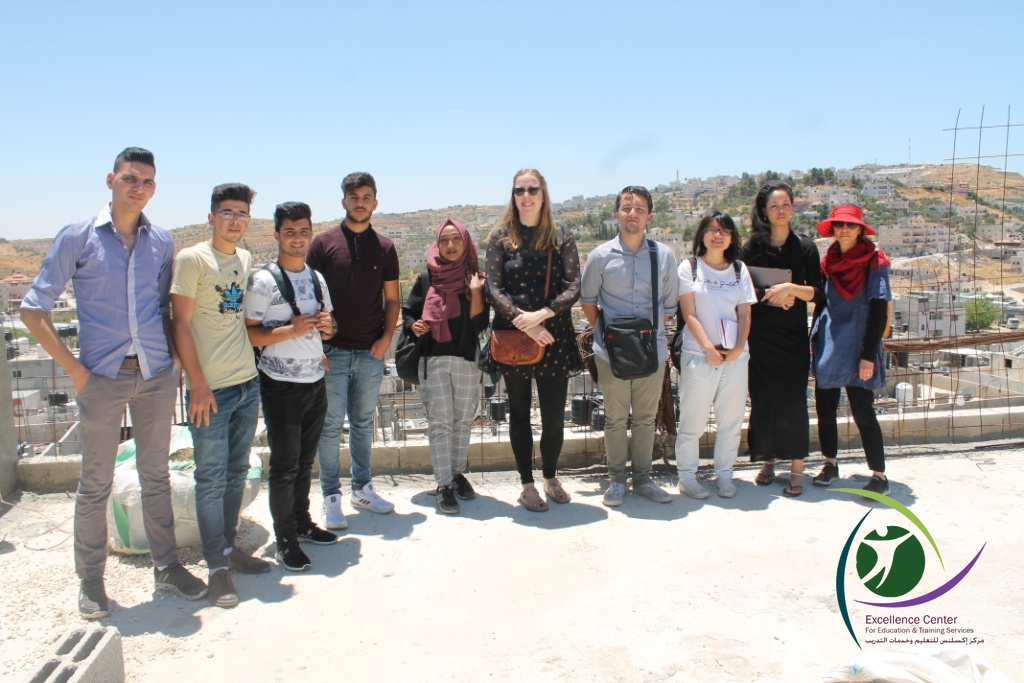
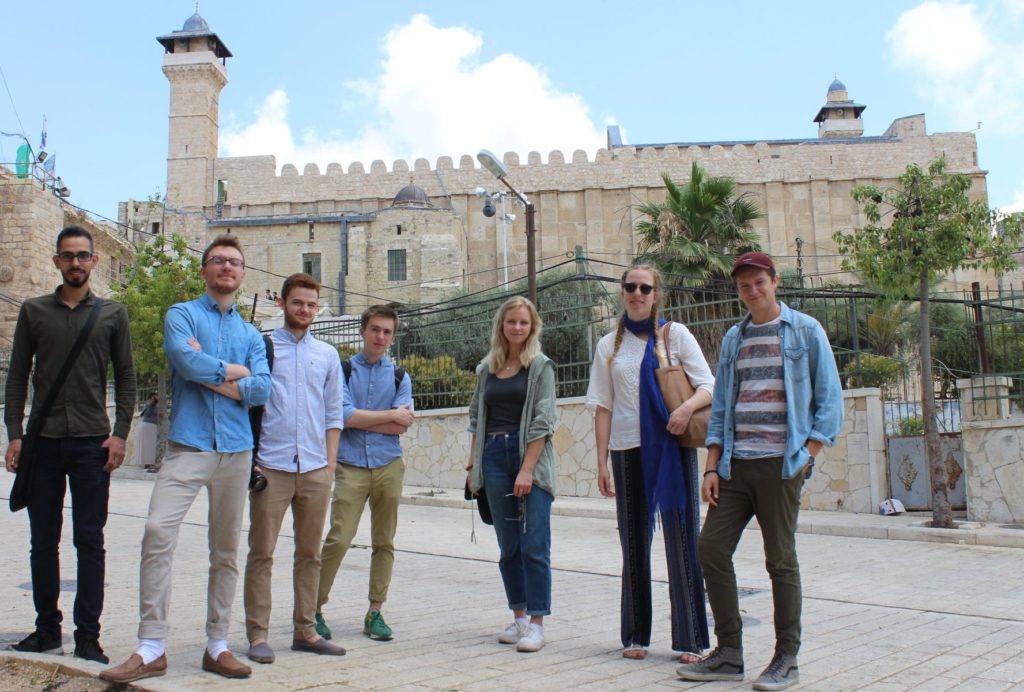
Borders Between Palestine and Israel
The checkpoints and borders between Israel and Palestine were created to control the movement of Palestinians, not the movement of foreign visitors. As such, these checkpoints should not be a hindrance or barrier to your passing between Israel and the West Bank. You may be asked to present your passport and Israeli visa and may be required to go through some security procedures, but these should only be minor inconveniences.
Essential Things to Know About Palestine
1. Accommodation while living in Hebron
Although each situation is different, male participants at Engage in Palestine will generally be housed at an apartment that is a short walk from Engage in Palestine, and female participants will be placed with a host family. This arrangement depends on the availability of host families, but individual situations and preferences will be considered when determining placement. Therefore, experiences can vary. For example, those with a host family can usually be expected to eat with the family. At the same time, those in apartments will have to make their own eating arrangements and learn to better navigate the outdoor markets and supermarkets.
2. Currency in Palestine
The “New Israeli Shekel” (NIS) is the currency used in the West Bank. For up-to-date exchange rates, go to http://www.xe.com/currencyconverter/.
There are usually 3.5 to 4 NIS to the U.S. dollar. Banks are open from 8:00 A.M. to 3:00 P.M. The major banks are the Arab Bank, the Bank of Palestine, the Cairo Amman Bank, and the Bank of Jordan. Be aware that most only give money in Jordanian dinars, which then must be further exchanged into shekels at currency exchange shops.
As most stores do not accept credit cards, the best way to cover your daily expenses is to use an ATM card and withdraw shekels from ATMs. ATMs are open 24 hours a day, and dozens of them are available throughout the city. Additionally, a Western Union office is a short walk away from Engage in Palestine. However, if you choose to bypass these methods, make sure you have enough cash on you for your entire trip.
3. Internet Access in Palestine
High-speed Wi-Fi is available throughout the country in homes, cafes, and restaurants throughout the city. Additionally, local banks have publicly available WIFI that can be accessed 24/7 from outside the building. The Wi-Fi is stable and reliable, and 3G is also available.
4. Purchasing a Palestinian SIM Card
A SIM card is a small plastic card that goes inside cell phones to allow them to work cheaply and effectively while traveling abroad. Most phones are SIM-card compatible, but you can check with your provider before coming to make sure.
You can buy either a Palestinian or an Israeli SIM card for your phone. The process for purchasing a SIM card in Palestine is simple. Getting a SIM card in Palestine gives you a local Palestinian number and the ability to receive free incoming calls at an affordable cost. The price for a SIM card ranges from 10-20 shekels. However, sometimes you can get a SIM card for free.
Plans for Palestinian SIM cards are prepaid, so there is no contract, and if you use up all your minutes, it is easy to add more. There are shops all around Hebron, including many that are within walking distance from Engage in Palestine, where travelers can purchase a SIM card and add more minutes to their phone plan.
Palestinian SIM cards are cheap but only have 2G, not 3G. If you want 3G, you must buy an Israeli SIM card. You can buy an Israeli SIM card in any city in Israel. A SIM card with one month’s worth of data and calls costs around 90 shekels ($25 USD).
If you choose not to purchase a SIM card, you can rely on Wi-Fi and utilize WhatsApp and Facebook Messenger to message and make phone calls.
Palestinian Culture & Etiquette
Just as the Arab world is culturally diverse, so is Palestine. Some significant cultural differences exist between North and South, and each city and village within the West Bank has its own traditions and cultural norms.
Palestine is a majority-Muslim country, and Sunni Islam is the most practiced religion. Hebron, Nablus, and Jenin are considered the most conservative, with Hebron itself generally recognized as the most conservative and religious city in the West Bank. Ramallah, a cosmopolitan capital, is far less conservative, as is Bethlehem, the city with the largest Christian population.
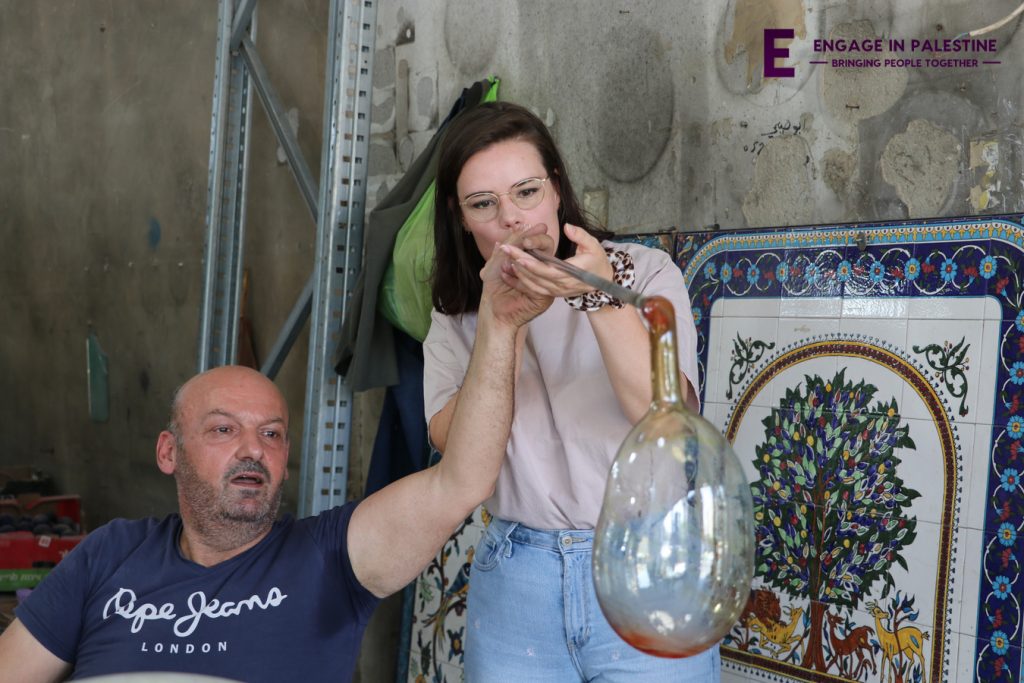
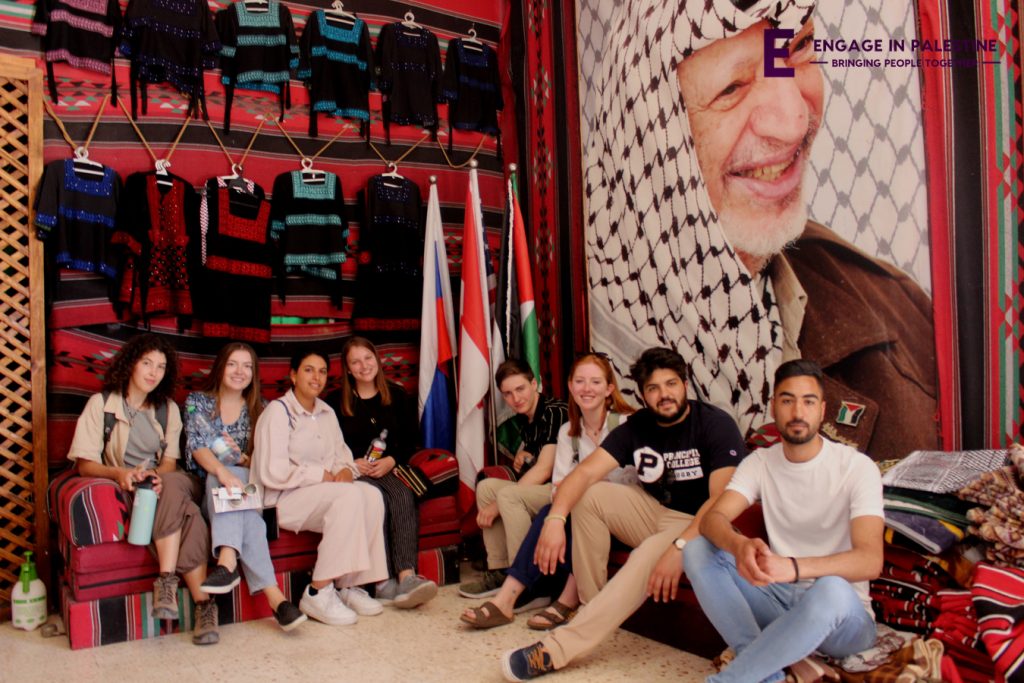
However, many of our international participants are surprised by the overwhelming hospitality of Palestinians. You will commonly be invited to drink tea, eat dinner, smoke shisha, or attend weddings and parties by colleagues, friends, and people you just met. Getting to know people in Palestine is extremely easy, and it’s perfectly normal for someone you don’t know well to extend an invitation for dinner or coffee. Feel free to accept these offers, or if you don’t feel comfortable, it is perfectly fine to decline politely.
If you live with a Palestinian host family, you will likely be invited to many events and get an inside look into Palestinian life. However, you may also encounter some cultural norms that might make you uncomfortable. For example, giving a guest “alone time” is something many Palestinians consider to be inhospitable. Additionally, Palestinians love to show off local cuisine, and your hosts will likely be extremely enthusiastic about the variety and volume of food you eat. It is important to respect the local residents and their culture, but it is also okay to communicate your needs when necessary.
1. Drinking Alcohol in Palestine
Because Hebron is a conservative religious city, alcoholic drinks are prohibited. There are no locations where you can buy alcohol, and visitors should avoid drinking or possessing alcohol during their stay in Hebron in order to show respect for the local culture and avoid uncomfortable situations with locals.
However, alcohol is not legally forbidden in all of Palestine. In fact, some cities such as Bethlehem and Birzeit have long traditions of wine and beer production (and consumption!). In these locations, drinking alcohol in moderation is acceptable, although, like many countries, including the United States, alcohol should not be consumed in public outdoor areas such as roadways or parks.
2. Dress and Attire in Palestine
The West Bank has slightly cold winters and moderately hot summers, although, during some summer months, it can be extremely hot, so plan to bring loose-fitting, lightweight clothes if visiting in the summer. As there are several modest norms in Palestine, especially Hebron, this guide is intended to help you dress in a way that will make you and others comfortable.
Women
It is not expected for non-Muslim women to cover their heads or bodies to the same degree as Muslim women in Hebron, who almost all wear the hijab and fully cover their bodies. However, you will feel more comfortable if you dress modestly, and clothing that reveals arms, your chest or legs will likely receive much attention. Most female volunteers opt for long skirts or trousers and loose-fitting shirts that reach the elbows. T-shirts are also fine.
Men
Men are also asked to dress modestly and are advised to cover from their neck to below their knees. Most men wear long pants to their ankles, not shorts, and in Hebron, most men do not wear jewelry. Sandals are fine for both men and women.
2. Both genders outside Hebron
Different cities have different cultural norms regarding dress. For example, the dress code is more relaxed in Ramallah and many cities in Israel. However, if you are planning to enter a holy site, you will be expected to dress modestly. Some areas are gender segregated as well, so be sure not to wander into the opposite gender space. Tattoos for men, particularly women, are highly unusual and may attract some attention. You may be more comfortable covering any tattoos that can be easily hidden.
3. Taboo Conversation Subjects
Understanding the conservative culture of Hebron and Palestine is beneficial when conversing with your host family or community members, as certain topics of discussion considered normal in other countries may not be appropriate to discuss casually here.
For example, discussions pertaining to religion and culture are fine, but one should be sensitive to the appropriateness of challenging aspects of both in conversation.
Furthermore, conversations about or including sex and sexuality are considered private matters and do not take place within social situations. Suppose you have not studied (and do not wish to study) Islam’s relationship to subjects like sex and sexuality. In that case, you should probably avoid or excuse yourself from any conversation involving the subject.
Additionally, please be sensitive when discussing the Palestinian-Israeli conflict, as initiating discussions about political topics or engaging in debate is not preferred. Palestinians will likely talk to you about their experiences under the occupation, and although these are good opportunities to listen and learn, be aware of your environment and the dangers and risks involved when talking openly about the conflict, given the Israeli presence here in Hebron.
In the classroom, teachers should always remain professional and avoid activities and discussions that include taboo topics.
Gender-Specific Norms and Concerns
International participants should be aware that Hebron is the most conservative city in the West Bank, leading to a variety of norms governing relations between and among genders.
- Men generally do not shake hands with women unless she extends her hand first. Instead, it is common to wave or touch your hand to your chest while greeting the opposite sex.
- In the evening, male and female internationals should avoid the appearance of impropriety. For example, male volunteers living in the apartment should not invite female participants over regardless of purpose (even, for example, to eat dinner). All sexual relationships between international visitors and locals or other international visitors are strictly discouraged.
- Most people in Hebron do not develop close friendships with members of the opposite sex outside of their family, so don’t be surprised if many social activities are somewhat sex-segregated. For instance, male students are more likely to invite male international volunteers to explore the city with them, and female students are more likely to invite female international volunteers to go shopping with them.
Know that you may not be afforded the same legal protections as you may be accustomed to in your home country. For instance, Palestine does not have laws protecting LGBTQ+ individuals from homophobic harassment. As a result, it is best to keep your sexuality discreet.
For female internationals, you may notice you are getting a lot of attention while walking down the street. Hebron is not a particularly touristy city, so locals are not always used to seeing Western women. Appropriate dress will alleviate some of this discomfort, though it will not completely eliminate it. Additionally, walking at night, especially by yourself, is not advised. Women in Hebron do not generally walk in the streets alone after dark, so doing so will likely make you stand out. It is best to be as safe as possible and get a taxi or ask for a ride from someone you know. If you decide to take a private taxi, make sure to take a yellow one.
Free Time in Hebron
It is very easy to find interesting and entertaining things to do in Hebron. There are many food and drink establishments lining Ein Sarah Street, Hebron’s main thoroughfare, on which Engage in Palestine is located, so for lunch, whether you want to get a quick takeaway falafel or find a spot to play chess and drink tea, Hebron’s city center will cater to you.
You will find fresh juice stands, ice cream and sweet shops, shawarma joints, and, if you can’t escape some Western cravings, even a KFC a short walk away. But do make sure you ask the other internationals where the “1 shekel donut” shop is—it’s a not-so-secret secret of the volunteers.
1. Shopping and Markets in Hebron
Hebron is a city filled with shops, stores, malls, and supermarkets. From small “mom-and-pop” markets to large modern grocery stores, you will most likely find what you need. There is also a large supermarket within a fifteen-minute walk of Engage in Palestine, where international participants go to withdraw currency from ATMs.
2. Sightseeing in Hebron
There are interesting sights to see while in Hebron, including the Cave of the Patriarchs (known locally as Ibrahimi Mosque) and the Oak of Abraham at Holy Trinity Russian Orthodox Monastery. According to tradition, the Oak marks the site where God and three angels appeared to Abraham and announced that his wife, Sarah, would become pregnant. You can also explore the miles of ancient souq in the Old City and visit the glassblower, ceramics, and keffiyeh factories in Hebron, watching these traditional products be made before your eyes.
Alongside this, if you pass through the checkpoint, you can view the Israeli settlement in H2, although be mindful that if you are Muslim or you present as Arab, the soldiers may deny your entrance to H2. Additionally, you may be more comfortable initially exploring H2 with a group. In H2, you can visit the Beit Hadassah Museum, explore the Tomb of Jesse and Ruth, and see Tel Rumeida, an archeological site that goes back to the Bronze Age. Visiting the Old City and the settlement will also give you a strong sense of the impact of the occupation and the political and social realities of the people who live nearby.
3. Fitness Centers and Gyms in Hebron, Palestine
Hebron has many gyms scattered around the city. Some generic gyms offer personal trainers and quality equipment, like the Prestige Gym, the Hebron University Gym, and Sama Al-Khalil. Still, specialized gyms are available if you have specific fitness goals or needs—for example, there are entire gyms dedicated to pilates, yoga, and intense muscle training. Many gyms are also open 12 hours a day, making them very accessible, and are typically separated between male and female.
Safety in the West Bank
If you are preparing to travel to Palestine, you have likely been asked, “Is it safe?” It is understandable that people have concerns about this, given the news coverage of Palestine, but it is important to know that safety concerns are the exception, not the norm.
Palestinians are very warm and friendly to visitors from all over the world. They are excited for internationals to visit and hear their stories. In part because of this mentality, street crime is very low—possibly even lower than the towns and cities in your country.
Palestine is considered a medium-safe destination, which is impressive given that it is an occupied zone. Remember that the people most unsafe are Palestinians themselves, followed by Israelis, followed—at a considerable distance— by foreign visitors. Foreign visitors are very rarely in any danger unless they actively go out of their way to put themselves in danger.
Safety in Hebron
Hebron, specifically, is sometimes perceived as an unsafe destination for international visitors. This perception derives from the presence of Israeli soldiers patrolling the checkpoints in the Old City and because Hebron is a conservative community. In reality, Hebron is a very safe city for internationals to visit, live, and work in, and you can read more about its safety here.
Although Hebron is a religious and conservative city, that does not make it unsafe for young Western visitors. It does, however, demand that visitors be respectful of the culture in the way they act and dress.
As an international, the presence of Israeli soldiers in the Old City and in the H2 section of Hebron has little or no impact on your daily life, and Engage in Palestine is located in a safe area outside of the Old City, which is under the control of the Palestinian Authority.
We Welcome You
Living in Palestine is an exceptional opportunity for internationals to meet Palestinian people, experience daily life, learn Palestinian Arabic, and observe the Israeli-Palestinian conflict first-hand. Most importantly, it is an opportunity to grow cross-cultural understanding and see the world from a new perspective.
Living in Hebron is a completely unique experience. Life is characterized by intensive social interactions, a spontaneous lifestyle where your day rarely goes according to prearranged plans, overwhelming hospitality, and an eagerness to learn and engage with others.
While some international participants find it difficult to adapt to local culture and daily life, most adapt quickly and report loving many aspects of the culture. Please do not hesitate to talk to the Engage in Palestine staff if you experience any difficulties but keep in mind that we cannot change the culture or habits of Palestinians.
We encourage you to arrive with an open mind, a desire to learn, and excitement for the adventure that lies ahead because we are sure you will have a wonderful and unforgettable stay in Palestine.
Find us online
WhatsApp:+972 599 479 880
Website: https://ecpalestine.org/
EC Website: https://excellencenter.org/
Instagram: https://www.instagram.com/excellence.center
Facebook page: https://www.facebook.com/ExcellenceCenter
Facebook account: https://www.facebook.com/RafatECHebron
Watch us on Youtube: https://www.youtube.com/channel/UCsQSLdFZWZcBm6Uj0XMYuKg
Visit and Explore Palestine: https://www.facebook.com/ExplorePalestine
